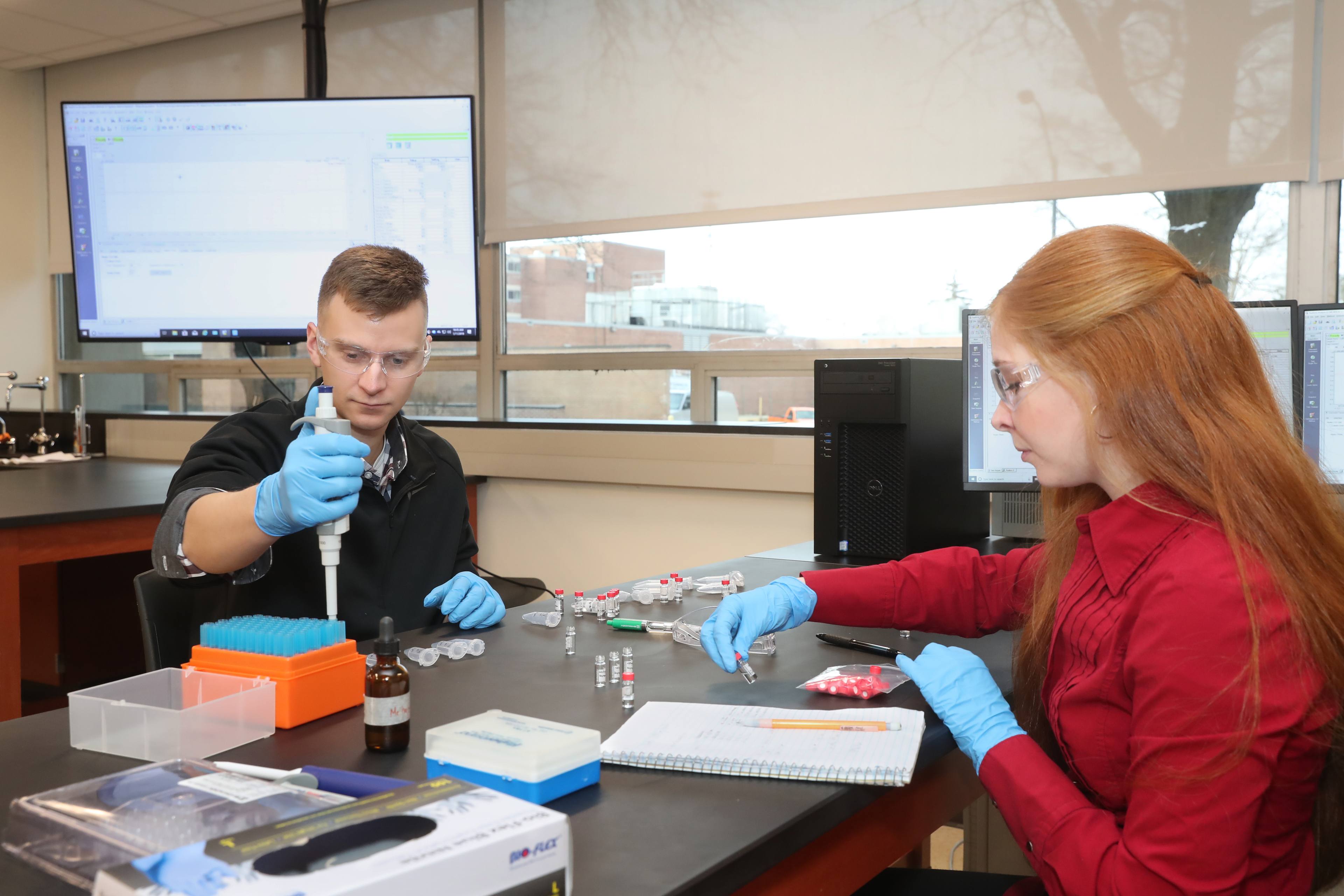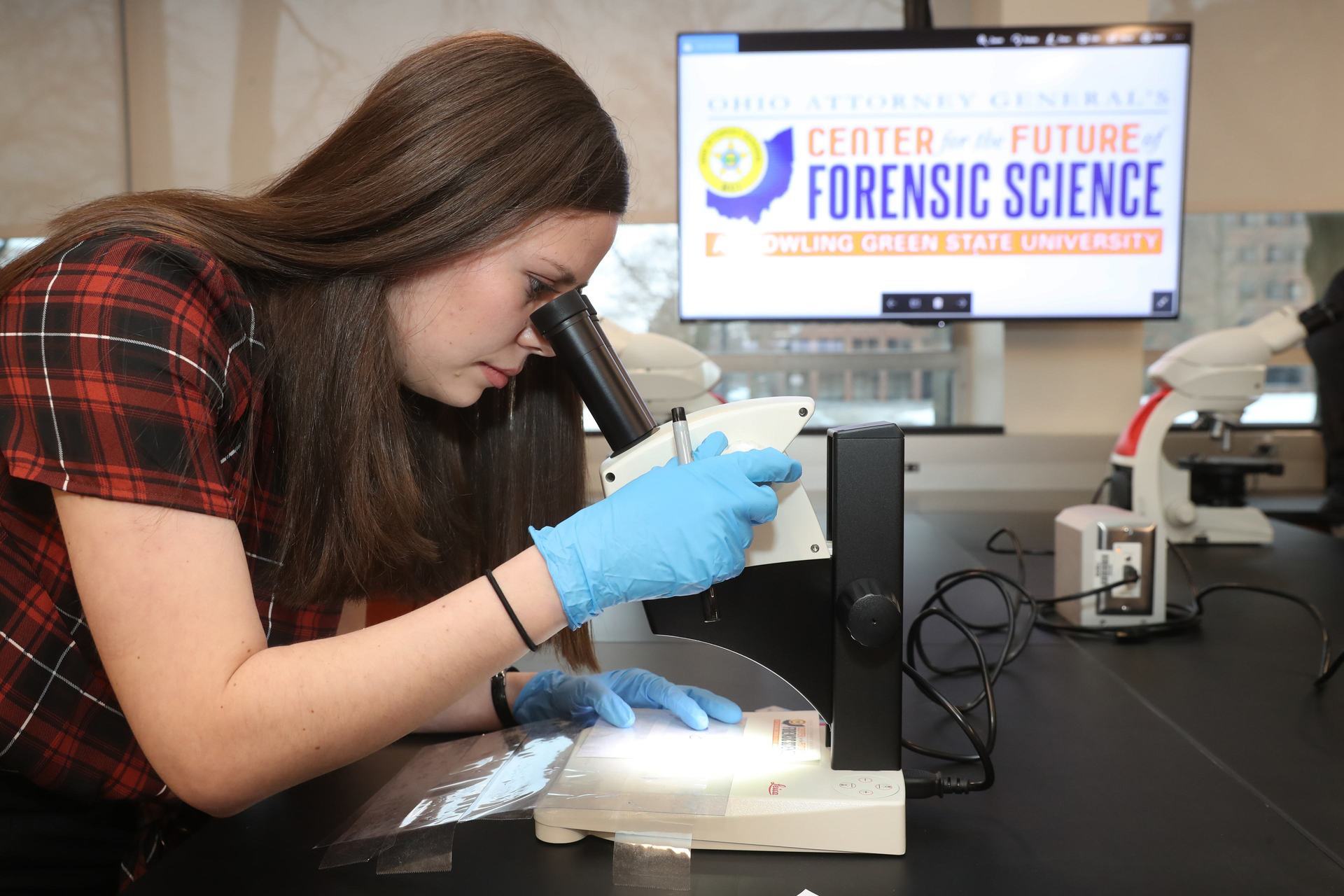Nationally recognized for student experience
The Wall Street Journal

Bachelor of Science (B.S.)
Forensic Science
Forensics is a field where science meets justice. Bowling Green State University is renowned as one of the best colleges for forensic science in the U.S.
The BGSU Bachelor of Science in Forensic Science program is one of the few in the country that:
- Is accredited by the Forensic Science Education Programs Accreditation Commission (FEPAC)
- Offers three distinct degree specializations (as opposed to just general forensics)
- Allows for an accredited accelerated bachelor’s-to-master’s degree
- Has a criminal investigation lab on campus
With a forensic science degree, you’ll acquire the specialized knowledge and technical skill necessary to uncover key truths, solve crimes and contribute to a fairer, safer society.
Undergraduate BSFS students get the education and hands-on training essential for entry-level forensic science jobs at top-rated crime laboratories across the country. BGSU forensic science majors choose one of three in-demand specializations:
Why study forensic science at BGSU in Ohio?
- FEPAC accreditation. Prospective students comparing forensic science schools quickly find BGSU tops the list as one of only two in Ohio with accreditation from the Forensic Science Education Programs Accreditation Commission (FEPAC) – a sought-after credential by employers. FEPAC-accredited programs meet rigorous curriculum, faculty, facility and academic support standards.
- Center for the Future of Forensic Science. The center is part of a groundbreaking partnership between the University, the Ohio Attorney General and the Bureau of Criminal Investigation (BCI). The CFFS Lab is a research center that offers unparalleled experiential learning for our forensics students.
- Learn from the best. Our faculty consists of expert forensic scientists with decades of professional crime laboratory work experience.
- State-of-the-art facilities. Students get hands-on experience with cutting-edge crime laboratory instrumentation in newly-designed forensic science classrooms, lab learning spaces and a mock crime scene house.
- Networking opportunities. BGSU forensic science students are encouraged to join the Midwestern Association of Forensic Scientists. The BGSU forensics program itself is a member of The Forensic Science Institute of Ohio, a group of Ohio Crime Laboratory directors and educators committed to promoting education and research.
- BGSU Delta Delta Epsilon. The BGSU chapter of this international forensic science honor society is dedicated to promoting community understanding and academic achievement.
BGSU is one of just 10 schools with both undergraduate and graduate accredited forensic science degree programs.
#1 public university in Ohio for career prep
The Wall Street Journal
Career - what can you do with a forensic science degree?
Forensics is a field that’s challenging, rewarding and ever-evolving. Forensic scientists analyze clues that lead to solving cases.
Professionals in forensics share a love for science as well as commitment to precision. They possess sharp minds, steady hands and strong ethics. They’re also competent communicators, frequently called on to explain complex scientific processes in plain terms.
Career tracks with a forensic science degree are broad.
- Forensic investigators identify, sample and record found substances.
- Forensic chemists analyze retrieved substances for identification.
- Forensic toxicologists study the effects of substances on the body.
- Forensic biologists study DNA left at crime scenes.
- Forensic investigators pinpoint the identity of perpetrators.
Work settings are diverse as well. Some forensic scientists work primarily in crime labs, evaluating physical evidence. Others are employed as crime scene investigators, collecting evidence directly at the site of reported crimes. You may do a little of both.
Some work for government agencies such as the FBI, while others may work in the private sector as consultants or expert witnesses.
Career paths
- DNA analyst
- Drug chemist
- Forensic toxicologist
- Trace evidence analyst
- Latent fingerprint examiner
- Firearm and toolmark examiner
Quick Facts from the Bureau of Labor Statistics
Specializations
We offer three distinct specializations within the Bachelor of Science in Forensic Science degree program.
- Forensic DNA analysis – provides the training crime laboratories require for application of biology and DNA analysis to forensic evidence.
- Forensic drug analysis – perfect for students interested in applying analytical chemistry to forensic evidence for effective crime-solving.
- Forensic examination – offers a strong background in chemical and biological sciences to build skills in pattern evidence examination. This is critical for forensic science tech jobs that involve tasks like latent print analysis and trace and impression evidence analysis.
Curriculum
The BGSU forensic science undergraduate curriculum was created in consultation with top forensic scientists at the Ohio Attorney General’s Bureau of Criminal Investigation to ensure learning outcomes align with career demands. Students get the hands-on experience that’s expected by today’s forensic science and criminal investigation employers.
Courses provide scientific foundations, experiential laboratory training and exposure to broader elements of the practice, such as:
- Evidence collection, handling, analysis and reporting practice
- Legal and ethical considerations
- Providing expert courtroom testimony
Toward the end of the degree program, forensic science students choose one of three culminating experiences:
- Internship. Forensics-related internships consist of 200+ on-site hours in a professional setting.
- Research. Choose between laboratory-based projects, theoretical literature-based papers or some combination. Forensics honors students can choose the research course to meet honors project requirements. Accelerated Master of Science in forensic science students can use the research course to plan their master’s thesis project.
- Capstone. Students process a mock case from beginning to end in their chosen discipline. They analyze the results, write a report and testify in a moot court setting.

Sample courses*
- Introduction to Forensic Science
- Forensic Biology
- Forensic DNA Analysis
- Pharm/Toxicology Drugs of Abuse
- Latent Prints
- Microscopy, Materials, and Trace Evidence Analysis
- Principles of Crime Scene Investigation
- Professional Responsibility
- *Note: Some courses are specific to certain forensic science specializations.
#1 university in Ohio – big or small, public or private – students would choose again
The Wall Street Journal
Summer Forensic Camp for high school students
BGSU’s virtual summer camp lets you experience what it’s like to be a forensic scientist.
- Classroom, lab and field experiences
- Taught by professionals from our cutting-edge forensic science program (They’ve even been featured on the hit show Forensic Files.)
- A virtual tour through a mock crime scene by a forensic scientist
- Home labs such as fingerprinting, evidence collection, blood typing and more.
News
The forensic science program is in the BGSU College of Arts and Sciences and affiliated with the Center for the Future for Forensic Science at BGSU.
Accreditation
The BGSU Bachelor of Science in Forensic Science program received full accreditation from the Forensic Science Education Programs Accreditation Commission (FEPAC) in 2022.
Bowling Green State University [BGSU] is accredited by the Higher Learning Commission. BGSU has been accredited by the Higher Learning Commission since 01/01/1916. The most recent reaffirmation of accreditation was received in 2022-2023, with our next reaffirmation of accreditation scheduled for 2032-2033. Questions should be directed to the Office of Institutional Effectiveness.
Request Information
Forensic science specializations
Forensic examination
Forensic DNA analysis
Forensic drug analysis
Updated: 09/15/2025 10:50AM



